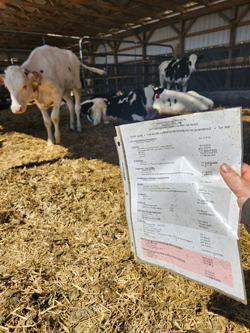
Yet, I find that the time I check the fly-speckled vaccine protocols hanging on the front of my barn office fridge is when we are having a disease-related problem on the farm. I know it’s human nature to wait until an issue pops up, but a few years ago when we were amid one of these panicky moments trying to address a calf related issue with a vaccine protocol update, I decided to schedule my next vaccine protocol check.
I scrolled forward two years in my phone calendar and scheduled a “vaccine protocol check” for 10 a.m. on a random Wednesday. I’m not saying that’s the only time I have checked on my protocol, but I like the idea of having a date to look at it that is not problem or panic induced, because I think it’s important to consider these things when not stressed and just trying to put out a fire.
When that reminder popped up in my phone a few weeks ago, I called my vet and asked to review our protocol with them. Then I pulled down that bespeckled sheet of paper and asked myself three questions.
- Are we following the protocols as far as timing and administration go?
- Are we having any specific disease problems that need to be addressed?
- Are there any vaccines that are hard to get supply chain-wise? Could they be replaced with another option or even eliminated?
Over the years, asking these questions has been beneficial to our farm. It lets us, along with our veterinarians, determine how we can best build immunity. One of the things that is important to us, and our vets, is that we schedule immunizations at a time they will actually get done.
This is especially important on our farm with bred heifers because our facilities don’t have a great space for catching animals for vaccinations. Therefore, we work our schedule so the most important vaccines can be administered when we are already working this group for another reason.
The American Association of Bovine Practitioners has a detailed document on cattle vaccination that is very helpful both in developing and updating vaccination protocol programs. Reviewing this information along with meeting with your local veterinarian can go a long way in establishing and maintaining a program that works best for the specific circumstances on your farm. Here’s your calendar reminder to find your protocol sheet and see what you can do to build your healthiest herd.

The author is a dairy farmer in Kansas and a former associate editor at Hoard’s Dairyman. Raised on a 150-cow dairy near Valley Center, Kansas, Maggie graduated from Kansas State University with degrees in agricultural communications and animal sciences.